EU inches closer to ban on end-to-end encryption
09 November 2020
An article in ITPro refers to a Council document released to the public by Statewatch, which reveals the long-standing nature of the EU's sought "balance" between robust security and ease of access for law enforcement.
Support our work: become a Friend of Statewatch from as little as £1/€1 per month.
"The Council of the European Union appears to have a near-completed resolution that would propose a ban on the use of end-to-end encryption on off-the-shelf apps such as WhatsApp and Signal, according to a leaked document.
The memo, dated 6 November and addressed to representatives from EU member states, reveals that strong encryption remains a priority for lawmakers but that the availability of end-to-end encryption has made it overly difficult for law enforcement to conduct investigations."
"The document appears to be a draft resolution from a meeting held on 3 November between members of the Justice and Home Affairs Council, titled ‘Security through encryption and security despite encryption’. Resolutions of this kind are not legally binding, but it may be used in the future to inform new legislation."
"Its existence doesn’t come as a complete surprise given that earlier document using the same title, leaked in September and circulated by Statewatch, made it clear that the topic had been discussed in numerous council meetings since 2016."
Find article here.
Our work is only possible with your support.
Become a Friend of Statewatch from as little as £1/€1 per month.
Previous article
Europol charts ‘value of accessing data’ in encrypted cybercrime
Next article
Spotted an error? If you've spotted a problem with this page, just click once to let us know.

